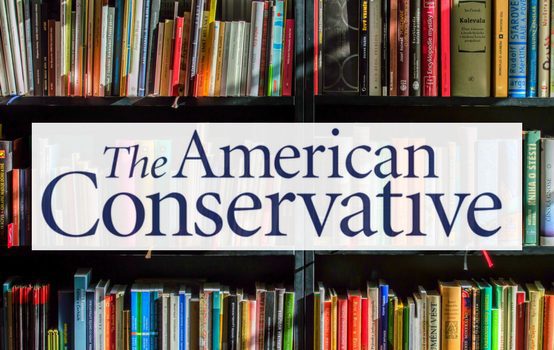TAC Bookshelf: Human Nature in the Modern Yukon

Bradley J. Birzer, scholar-at-large: The most important book to hit the stands over the last quarter year is Marcus Witcher’s astounding, penetrating, and insightful re-examination of the 40th president and his legacy, Getting Right With Reagan: The Struggle for True Conservatism, 1980-2016 (University Press of Kansas). Armed with mighty research and a fluid pen, Witcher asks the questions that so desperately need to be asked after two decades of consumer, corporate, and populist conservatisms. Just what is conservative? What is Reagan’s place within our modern conservatism? What role does myth play in our understanding of history and biography? Just why do we need heroes? Though having just come of age (seventh grade) when Reagan took office and being only a senior in college when the Berlin Wall came down, I have found many treasures in this book, which has forced me to reassess a number of vital things.
For pleasure, I’ve been reading Kelley Armstrong’s Casey Duncan/Rockton series, set in the modern Yukon. Indeed, “reading” is a tepid way of putting it. I’ve devoured all five novels over the past two months, unable to get enough of the characters or the story. Rockton, somewhere to the east of Dawson City, is a refuge city, populated by only 200 residents and hidden from modern surveillance. Generators and firewood power the town, and there’s no television, radio, or internet. If you’re escaping an abusive spouse or the mob, you head to Rockton. Sadly, many who are fleeing justice have taken refuge there as well. Armstrong brilliantly explores the nature of both society and, well, nature! Though Rockton is relatively safe from the ravages of nature, it has its own internal problems—especially given the secrets of those living there. Near the town reside the mysterious hostiles (persons who have resorted to extreme primitivism) and settlers (modern-day pioneers). Casey, a brilliant detective from a family of surgeons, is the main character, and her boyfriend, Eric, is a modern noble savage. Somehow, Armstrong has fashioned thrilling stories while also asking poignant sociological, anthropological, and philosophical questions. These are smart stories for smart people. One warning—as good and creative a writer as Armstrong is, she relies way too much on foul language.
I’m also re-reading Peyton Place. Though scandalous at the time of its publication in 1956, the novel is really a dull creep through the various neighborhoods of a New England town. Still, the “peeping Tom” plot revels much about what could and couldn’t (or shouldn’t) be revealed in a more innocent age.
And finally, for personal edification as well as for a class I’m teaching, I’ve been re-reading T.S. Eliot’s Dante-esque poems, “The Wasteland,” “Hollow Men,” “Ash Wednesday,” and “The Four Quartets.” “Teach us to care and not to care/Teach us to sit still.”
Emile A. Doak, director of development: Our editorial staff deserves credit for severely crowding my reading list. The Arts & Letters section of our latest print issue includes reviews of a collection of must-read books, among them The Age of Illusions by Andrew Bacevich, The Age of Entitlement by Christopher Caldwell, The Decadent Society by Ross Douthat, and The New Class War by Michael Lind. (The reviews themselves, by the likes of Michael Desch, Micah Mattix, and F.H. Buckley, are equally worthwhile.) If you’re not yet a TAC print subscriber, you’re missing out.
I’ve started working my way through this list with Lind’s The New Class War. Lind’s grappling with the populist movements that have swept the West places The New Class War in line with similar works like David Goodhart’s The Road to Somewhere, Tim Carney’s Alienated America, and Rusty Reno’s Return of the Strong Gods. What The New Class War adds to the conversation is Lind’s focus on class as a determinative factor in the current unraveling. That many conservatives eschew issues of class outright—denouncing them as covertly, vaguely Marxist, or rather as immaterial in a supposedly class-fluid America—says more about the irrelevancy of mainstream conservative thought than it does about Lind’s thesis. Our society is increasingly stratified between a transient managerial overclass and a disproportionately native-born working class. Lind seeks to find a synthesis.
It’s in this quest for synthesis that The New Class War reveals its shortcomings. From the outset, Lind sketches the narrative of his thesis: “Demagogic populism is a symptom. Technocratic neoliberalism is the disease. Democratic pluralism is the cure.” What this solution presupposes is that a synthesis is in fact possible, that today’s managerial elite will concede to a sort of power-sharing arrangement with the same working class they so often scorn. Yet if their rhetoric (“Deplorables! Bigots! Cling to their guns and religion!”)—or really just any moment from the candidacy of Pete Buttigieg—is any indication, this class divide could be too severe to be reconciled.
Patrick Deneen offers an alternative in his review of Lind over at First Things:
What’s needed is not “democratic pluralism” in which the ruling class remains a neoliberal, managerial elite who strategically concede some wealth and status to their inferiors. What’s needed is a fundamental displacement of the elite ethos by a common-good, popular conservatism that directs both economic goals and social values toward broadly shared material and social capital, toward the support of family and community life.
There’s a reason Bernie Sanders’ talk of a political “revolution” resonates. Our social arrangement is fundamentally sick, creating and perpetuating classes whose interests couldn’t be more different. Lind recognizes this. But what’s needed, contra Lind, is more fundamental than a new balance of power, and, contra Bernie, less uncompromising than a revolution. What’s needed is a realignment of the political norms that have created the current circumstances. Insofar as The New Class War sets the stage for this realignment, it’s an indispensable book.
Comments